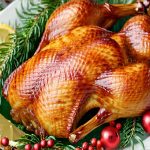The holidays are often a joyous time filled with festive gatherings, delicious food, and cherished memories. However, this abundance can frequently lead to digestive discomfort – that uncomfortable feeling of fullness, bloating, heartburn, or general malaise after indulging in rich meals and perhaps a little (or a lot!) extra. It’s incredibly common, and most people experience some level of digestive upset during and immediately following the holiday season. The good news is that many strategies can help manage these symptoms and restore your digestive system to its happier, more comfortable state. This isn’t about restrictive dieting or feeling guilty; it’s about understanding how our bodies respond to increased food intake and proactively supporting healthy digestion.
Post-holiday digestive issues aren’t necessarily a sign of anything serious. Often, they are simply the result of overeating, consuming foods that are higher in fat, sugar, or alcohol than usual, and potentially disrupting your regular eating schedule. Our digestive systems can be remarkably resilient but need time to adjust after being overloaded. Understanding what’s happening internally – the increased workload on your stomach, intestines, and liver – is the first step towards effective management. This article will explore practical ways to alleviate discomfort and gently guide you back toward a balanced digestive state, focusing on lifestyle adjustments and supportive strategies rather than quick fixes. You may also find information about digestive response slowing after holiday eating helpful in understanding the process.
Understanding Post-Holiday Digestive Distress
Digestive discomfort after holiday overeating stems from several interconnected factors. Primarily, consuming large quantities of food stretches the stomach, causing feelings of fullness and bloating. Rich, fatty foods take longer to digest, further contributing to these sensations and potentially leading to heartburn as stomach acid refluxes into the esophagus. The sudden influx of sugar can also disrupt the gut microbiome – that complex ecosystem of bacteria living in our intestines – leading to gas, bloating, and altered bowel movements. Alcohol consumption adds another layer of complexity, irritating the digestive lining and interfering with nutrient absorption. It’s important to remember that digestion is a multi-stage process, and overloading any stage can create ripple effects throughout the entire system.
The gut-brain connection also plays a significant role. Stress – which often accompanies holiday gatherings and travel – can directly impact digestion. When stressed, our bodies prioritize other functions over digestion, slowing down the digestive process and exacerbating discomfort. This is why some people experience more intense symptoms when feeling anxious or overwhelmed. Moreover, changes in routine – altered sleep schedules, less physical activity – can further disrupt digestive function. Restoring a sense of normalcy and incorporating mindful practices are crucial for easing both physical and emotional stress. Recognizing how weekend diet breaks can contribute to this is also important.
Finally, food intolerances or sensitivities that might normally be manageable can become more pronounced after overeating. A larger volume of food simply puts greater strain on the system, making it harder to process certain ingredients and increasing the likelihood of triggering symptoms like bloating or diarrhea. Recognizing your body’s individual responses is key to managing these issues effectively.
Gentle Strategies for Digestive Relief
The cornerstone of post-holiday digestive recovery lies in giving your system time to rest and recover. This doesn’t mean deprivation, but rather a shift toward lighter, easier-to-digest foods. Start by reducing portion sizes and focusing on whole, unprocessed options like fruits, vegetables, lean proteins, and whole grains. Hydration is also paramount – water helps move food through the digestive system and prevents constipation. Aim for at least eight glasses of water per day. Avoid heavily processed foods, sugary drinks, excessive caffeine, and alcohol, as these can further irritate your digestive system.
Consider incorporating specific foods known to support digestion. Ginger, for example, has anti-inflammatory properties and can help relieve nausea and bloating. Peppermint tea is another excellent option, soothing the stomach muscles and reducing gas. Probiotic-rich foods like yogurt (if tolerated) or fermented vegetables can help restore balance to your gut microbiome. However, introduce these gradually to avoid further upsetting your system. Gentle exercise, such as walking or yoga, can also aid digestion by stimulating bowel movements and relieving stress. Many experience digestive discomfort after high-fat holiday meals which can be managed with these techniques.
Finally, mindful eating practices are incredibly beneficial. Take the time to savor each bite, chew thoroughly, and pay attention to your body’s signals of fullness. Avoid eating quickly or while distracted, as this can lead to overeating and indigestion. Prioritizing slow, deliberate meals allows your digestive system to work more efficiently. It’s also helpful to consider how intense work sprints impact digestion similarly.
Soothing Specific Symptoms
Digestive discomfort manifests in many ways, and addressing specific symptoms requires targeted approaches.
- Heartburn/Acid Reflux: Elevate the head of your bed while sleeping can help prevent stomach acid from flowing back into the esophagus. Avoid lying down immediately after eating. Over-the-counter antacids can provide temporary relief, but long-term reliance should be avoided; consult a healthcare professional if heartburn is frequent or severe. Identify and avoid trigger foods like spicy foods, citrus fruits, chocolate, and caffeine.
- Bloating/Gas: Gentle abdominal massage in a clockwise direction can help move gas through the digestive system. Avoid carbonated beverages and chewing gum, which can contribute to bloating. Consider incorporating fiber gradually into your diet, as it promotes regular bowel movements but can initially increase gas production. If you suspect food sensitivities, keep a food diary to identify potential triggers.
- Constipation: Increase your fluid intake and incorporate more fiber-rich foods into your diet. Regular physical activity helps stimulate bowel movements. Avoid processed foods and sugary drinks, which can worsen constipation. If constipation persists for more than a few days, consult a healthcare professional.
The Role of Gut Microbiome Support
As mentioned earlier, the gut microbiome plays a vital role in digestion and overall health. Holiday overeating often disrupts this delicate ecosystem. Supporting your gut microbiome is therefore crucial for long-term digestive well-being. This can be achieved through several strategies:
- Probiotic Foods: Incorporate probiotic-rich foods like yogurt (with live and active cultures), kefir, sauerkraut, kimchi, and kombucha into your diet. Start slowly to assess tolerance.
- Prebiotic Foods: Prebiotics are fibers that feed the beneficial bacteria in your gut. Excellent sources include onions, garlic, bananas, asparagus, oats, and apples.
- Limit Antibiotics: Unless medically necessary, minimize antibiotic use, as they can disrupt the gut microbiome.
A healthy gut microbiome is associated with improved digestion, enhanced immunity, and even better mental health. It’s a long-term investment in your overall well-being. You might also experience digestive trouble after back-to-back holiday meals if the gut microbiome is compromised.
Preventing Future Digestive Discomfort
While managing symptoms is essential, preventing future digestive issues is ideal. This involves adopting mindful eating habits and prioritizing a balanced lifestyle year-round.
- Portion Control: Be mindful of portion sizes, even during celebrations. Use smaller plates and listen to your body’s fullness cues.
- Balanced Diet: Focus on a diet rich in whole, unprocessed foods – fruits, vegetables, lean proteins, and whole grains. Limit processed foods, sugary drinks, and excessive fat intake.
- Regular Exercise: Incorporate regular physical activity into your routine to promote healthy digestion and overall well-being.
- Stress Management: Practice stress-reducing techniques like meditation, yoga, or deep breathing exercises to minimize the impact of stress on your digestive system.
- Hydration: Drink plenty of water throughout the day to keep your digestive system functioning optimally.
Ultimately, a proactive approach – prioritizing mindful eating, balanced nutrition, and stress management – is the key to enjoying holiday celebrations without sacrificing your digestive health. Remember that occasional indulgence is perfectly normal; it’s about finding balance and supporting your body’s natural processes. If you find yourself consistently struggling with digestion, consider what digestive discomfort after avoiding high-fiber grains might be contributing to the issue.


















